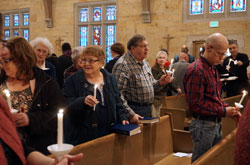Ecumenical relations nurtured at local level on Indianapolis’ west side

Judy and Bob LaEace, members of St. Michael the Archangel Parish in Indianapolis, hold candles during a March 11 ecumenical prayer service at their parish’s church. St. Michael and three other nearby Christian congregations on Indianapolis’ west side have deepened their ecumenical relationship through prayer and discussion of race relations. (Submitted photo)
By Sean Gallagher
For years, a Catholic parish and three other Christian congregations have been located within an easy walking distance of each other on the west side of Indianapolis.
In recent months, they have come together in an ecumenical effort to provide opportunities for common prayer and to discuss racial problems at the local and national levels.
The congregations involved in the initiative are St. Andrew Presbyterian Church, St. Michael the Archangel Parish, Seventh and Eighth United Christian Church and Wesley United Methodist Church, all located in the neighborhood along 30th Street and Kessler Boulevard on Indianapolis’ west side.
The relationships among the congregations started to deepen last summer when Father Michael Hoyt became St. Michael’s administrator. He soon met Rev. Reginald Lee, senior pastor of Wesley United Methodist, which is adjacent to St. Michael.
“It started at the level of friendship and discussions about current events,” said Father Hoyt.
The conversation soon included Rev. Jeff Castetter, the minister of Seventh and Eighth United Christian Church, and Rev. Gretchen Schneider, pastor of St. Andrew Presbyterian Church.
Members of all four congregations located in a racially diverse neighborhood were welcomed into the conversation during an event on March 1 at St. Michael titled “Where Do We Go From Here: Community or Chaos?,” a discussion about race relations inspired in part by racial unrest the previous year in Ferguson, Mo., and New York.
The title of the event was also the title of a book written by Dr. Martin Luther King, Jr.
The conversation was led by Dr. Alan Boesak, professor of peace and justice at Christian Theological Seminary in Indianapolis and a native of South Africa.
“He brought a unique perspective to the conversation,” said Rev. Lee. “He was on the cutting edge, working with Desmond Tutu and Nelson Mandela. He will continue to be a resource for us as we seek to have continued conversations about this.”
During Lent, members of the congregations came together four times for prayer services.
“It was a very important part of Lent for me,” said Marilyn Rausch, a member of St. Michael Parish. “It made me more aware of the faith of people around me. And it gave me hope for what we can do in the future.”
Rausch, who is also a lay associate of the Sisters of Providence of Saint Mary-of-the-Woods, has been a member of St. Michael for 30 years. She said the recent ecumenical initiative is the “most direct” common effort among the congregations she’s known in her time at the Indianapolis West Deanery faith community.
“It makes us feel more unified with the neighborhood,” she said. “It’s not an ‘us versus them.’ We’re all here to be witnesses to each other.”
Rausch said that this is important because there are areas of Indianapolis close to the four congregations negatively affected by crime and activities tied to illegal drugs.
Whatever efforts the congregations make in the future to improve their neighborhood and the surrounding area, however, will need to be based in prayer, says Rausch.
“We felt that, by working together with the other churches, we could strengthen the faith in this neighborhood,” she said. “My own feeling, though, is that the only way that we can achieve peace and lose violence is through prayer.”
For Father Hoyt, this prayer is rooted in each congregations’ faith in Christ.
“We’re united in our love for Jesus Christ,” he said. “Our approach to ecumenical dialogue passes through, in the first place, our common love for Jesus.”
Rev. Lee has been satisfied by seeing the leaders of the congregations reach beyond themselves in this fledgling ecumenical initiative.
“It has given us a sense of collegiality and common purpose,” he said. “We don’t see ourselves as competitors, but as colleagues in ministry sharing a common ministry within the bounds of the 30th Street-Kessler Boulevard area.”
He also noted that the initiative takes ecumenical relations—so often occurring between experts and national and international Christian leaders—and places them at the local level.
“Ultimately, at the end of the day, it is us who will have to work this out in a particular context at the local level,” Rev. Lee said. “We are really working hard in these four congregations to find a way to work together. We’re excited about that.”
In coming months, there are plans that this work will continue in a series of small groups made up of members of the four congregations.
“We’ve got about 40 people interested in engaging in small group activities,” said Father Hoyt. “We’ll mix all the different congregations together to continue the conversation. Eventually, we’ll come back to a larger group and see where this leads us.”
Rausch hopes that the improved relations among the neighboring faith communities will not be “a flash in the pan.”
“It needs to grow from the roots, and the roots are in prayer,” she said. “Action will follow that.” †
